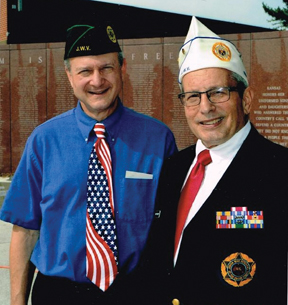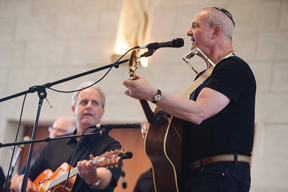
Rabbi H. Scott White is retiring after 14 years as Congregation Ohev Sholom’s rabbi on July 31. But that doesn’t mean he’s moving away from the area or quitting the congregation.
“People keep asking me, when am I leaving Ohev,” he said in an interview with The Chronicle. “The answer is I’m not leaving; I’m just retiring. Civia and I will continue to be members.”
In fact, Rabbi White will continue to lead the once-a-month Shir L’Shabbat service one Saturday morning a month along with Anna Jaffe, Linda Salvay and Adira Liebschutz. They use acoustic guitars and percussion instruments to enhance the Shabbat worship experience for all attendees through song.
The road to the rabbinate
Rabbi White grew up in the Kansas City Jewish community, became a Bar Mitzvah and was confirmed at The Temple, Congregation B’nai Jehudah. He discovered his passion for Judaism and desire to become more observant in 1977 while he was in Israel on a study abroad program. He’s been a traditionally observant Jew for 42 years now.
After graduating from the University of Kansas in 1979 with a degree in journalism, he went back to Israel to continue studying Judaism in a yeshiva. Once there, he quickly realized he was “not cut out to be Orthodox.” That narrowed his options for study, but he found the Jewish Theological Seminary of America (JTS) appealing.
Rabbi White didn’t originally intend to become a rabbi. But after two years of studying in Israel and another three in New York, he said, the smicha (rabbinical ordination) he earned in 1986 “was sort of gravy that came with that.”
Now that he was ordained and starting a life with his wife, Civia, the Yiddish phrase nem de gelt, which means “grab the money,” came to mind. He needed a job and serving as a rabbi seemed perfect for his skills.
“So I decided to put the professional degree to use, and I have to tell you it stood me well,” he said. “I’ve always had work. Thanks to JTS, I’ve never been without a paycheck for 34 years.”
Another bonus to being a rabbi is that it afforded Rabbi White the opportunity to live according to his religious principles.
“I’ve never had to decide whether to alienate my employers by not going to work on the first day of Pesach. I’ve been able to go to work on the first day of Pesach for religious Jewish reasons.”
Rabbi White also enjoys working with people, something that fills a lot of a rabbi’s day.
“Really, you’re working for Hashem,” he said. “But it’s really working with people, whether you are in a congregation or you’re in education, which I was doing full time for 10 years. That’s just younger people.”
What’s ahead
Rabbi White held pulpits in Rhode Island and North Carolina before returning to Kansas City in 1994 to join the faculty of the Hyman Brand Hebrew Academy (HBHA), where he taught for 10 years while rotating between weekend pulpits in St. Joseph, Missouri, and Lawrence, Kansas. He took over at Ohev in 2005.
Less than a month after he retires from the pulpit, he will officially return to HBHA to teach 10th grade Jewish history three days a week.
Besides teaching at HBHA, the 62-year-old rabbi plans to spend more time at the Jewish Community Center’s Fitness Center.
“I’m there every day for about an hour, so I want to double my time with that at least,” he explained. “Now after I work out, I can sit in the sauna and schvitz for a while and not feel guilty about not getting back to work.”
He’ll also be able to devote more time to his music, which has always played a significant role in his life. Some of his musical projects include the Jewbie Brothers, and some of his bandmates are old buddies from his AZA days.
“We’re still writing music. … I’ve gotten the bug and once in a while I get inspired,” he said. “I’m hoping we’ll have a decent enough catalog of original Jewish music at some point that we’ll even record it.”
The band gets together for the love of music, and spending time with one another.
“We’ve never been paid for our performances, we don’t expect to be paid, and we don’t want to be paid,” he explained.
The Jewbie Brothers will play a short set at his upcoming retirement brunch, as will harpist Mike O’Shiver. Rabbi White and O’Shiver have recently begun collaborating on music.
In Jewish music, Rabbi White particularly likes Psalms. He explains the harp is the original instrument that the Psalms were set to, and it’s been a thrill for him to be able to work with a man of Michael’s “musical talent.”

Home sweet home
While Kansas City has three homegrown rabbis — Rabbi Arthur Nemitoff at B’nai Jehudah and Rabbi Doug Alpert at Kol Ami are the others — Rabbi White knows how lucky he’s been to be able to serve in the community where he has such strong roots.
“I got to actively maintain childhood friendships in a way that wouldn’t have been possible if I were elsewhere. I know that’s saying the obvious, but that’s been a real bonus for me that I didn’t necessarily count on when I became ordained,” he said, noting he considers his family — his brother, sister and cousins — among those he calls friends.
“It’s not like being a lawyer, an accountant or a doctor. …There are only so many rabbi jobs to go around in a small community, so I’ve been lucky to have two longstanding jobs here in Kansas City, almost a quarter century, 14 years at Ohev and 10 years at the Academy, that I’ve been able to secure, and then I’m still active friends with a lot of people I grew up with. That’s been the best thing for my social life. And the synagogue has been really, really good about affording me the opportunity to do that. The rabbinics have always been the priority, obviously, but I haven’t been busy all the days 24/6 such that I couldn’t spend timewith my lifelong friends.”
At Ohev, serving in a pastoral role has been the most satisfying part of being its rabbi.
“The most fulfilling was being able to facilitate either grief or joy, depending on the situation a member or a member family was experiencing,” he explained. “It’s wonderful to be a part of that joy and help facilitate it and be the fulcrum for the planning and the religious aspects.”
He’s proud he was able to help in some life and death situations that were above and beyond the usual of people growing older and subsequently getting sick and dying.
He’s not sure how much pastoral work he’ll do down the road, but Rabbi White asked the congregation to set up a charitable fund in his name when he does do such work.
“The proceeds from any rabbinical work I do after July 31 will go into the charity fund and not to me personally,” he explained. “I’m leaving behind any personal gains from being a rabbi. I want to do it all for charity now.”
He thinks that, once he retires, he won’t miss writing weekly sermons.
“It has never been my aim to jump up and say words that will change the world,” said the rabbi, who further explained he was more likely to package what was on his mind “in such a way that it related to the weekly Torah portion.”
He said it wasn’t always easy to come up with things to say every week, and sometimes he would have to dig deep.
“When I look back at things, I think that it’s really unbelievable that the same folks have been coming back and hearing me week after week after week for 14 years. I would think it would get a little old and maybe it has, and they just haven’t told me. I’ve always enjoyed the opportunity to speak my mind.”
Rabbi White said he did the best he could to stay away from controversy.
“I’ve always tried to take care of the community so that there is not any kind of rift or division over anything. The last thing I want to do is to start that up by saying something in my sermons that is going to separate people. On politics and things like that, I’ve tried to take a big-picture view and not talk about who is right or who is wrong but how horrible it is that we are divided, and not so much get into the reasons.”
A passionate Zionist, the Whites considered making Aliyah to Israel, but he doesn’t think that’s in the cards for them. He will continue to be a student of Israel and work on the Jewish state’s behalf.


